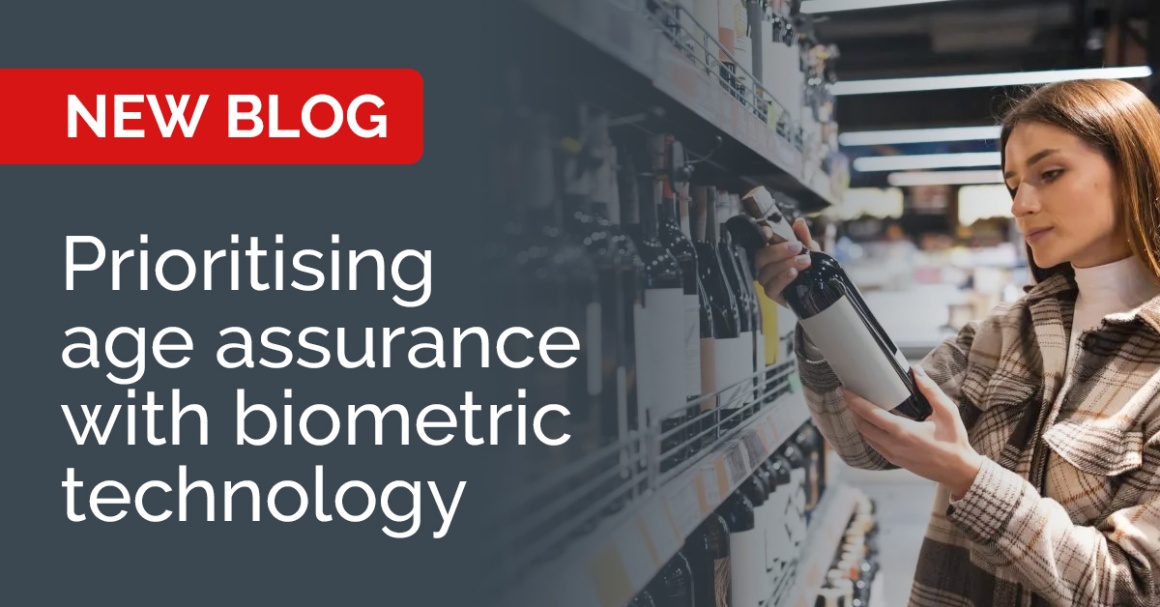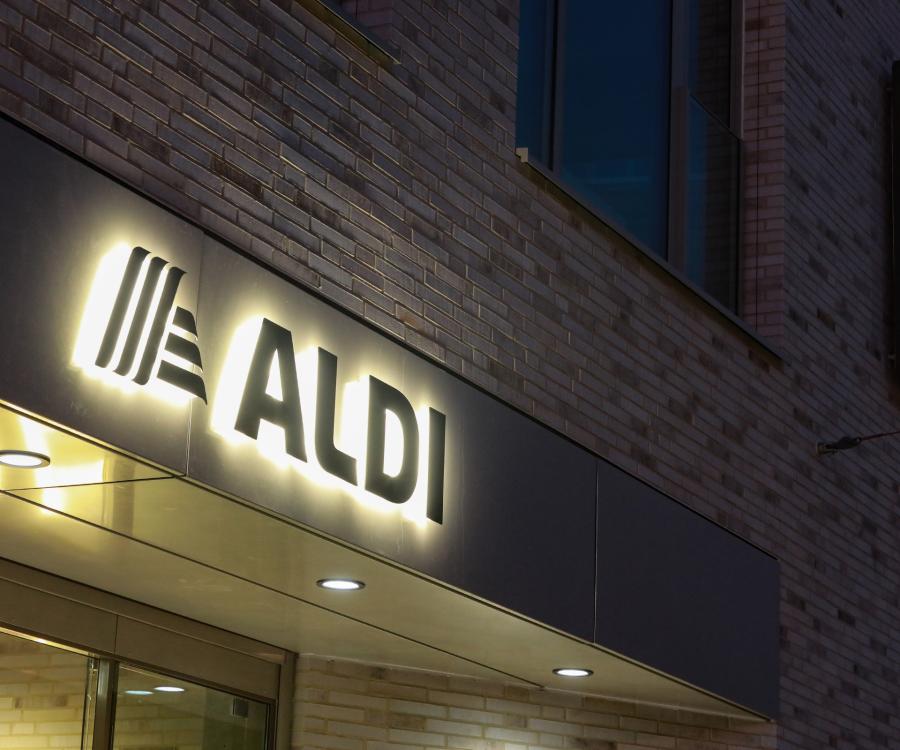There are no two ways about it – any business that deals with age restricted goods and services needs to have an airtight age assurance strategy in place to protect both itself and its customers. This is especially true in industries where age restrictions are particularly commonplace, such as retail, gambling and even cinema. But how can you be sure that your age assurance policy is working, and that your employees are confidently implementing it?

In this blog, we explore what it means to prioritise age assurance for your business, and how innovations in biometric technology can help make your age assurance strategy more efficient and accurate.
What is age assurance?
The term ‘age assurance’ refers to a number of methods used to estimate or establish the age of an individual. It can be considered an umbrella term that covers both age estimation and age verification, depending on the degrees of certainty that the solutions can offer.
Age estimation: A process that establishes whether a user is likely to be of a certain age, fall within an age range, or is over or under a certain age.
Age verification: A system that relies on hard identifiers, often physical, or verified sources of identification that provide a high degree of certainty in determining the age of a person.
In day-to-day life, it is most commonly necessary in retail industries, but is a requirement for any sector handling potentially dangerous or restricted goods and services. It can take a variety of formats, which could traditionally include:
- Self-declaration
- Third-party age checks
- Official identification
However, there are flaws with each of these methods on their own. Self-declaration can be difficult to verify, and third-party checks can involve a longer process and slow down sales. Official identification is most commonly used, but can cause issues around privacy as ID often contains more sensitive information such as name and home address. This could be dangerous information in the wrong hands, so employees need to be vigilant about data protection.
Age assurance is a crucial part of any business that works with restricted products. Not only could your business be fined, your licence could be revoked or you could face imprisonment, but you could also be putting the underage customer in danger.
Traditionally, your staff would have to use their best judgement to ascertain whether a customer is of the appropriate age to purchase a restricted product or service, asking for their ID if they were at all unsure. Legislation such as the Challenge 25 rule aims to decrease the risk of incorrect identification by requiring customers to show their proof of age if they appear under 25, regardless of the purchasing laws in their region.
However, human error is sometimes unavoidable, and with over eight million people having used a fake ID in the UK alone, including 33% of people aged 16-24, there is only so much your staff can be expected to do to prevent underage sales. Fortunately, advancements in biometric technology mean that your employees don’t have to shoulder the burden of age estimation alone.
How can biometric technology help?
Biometrics for age estimation work by analysing the customer’s facial features to predict their age, offering servers an added layer of security when selling restricted products or services. The process is completely anonymous, so no documents are seen and it is completely GDPR compliant. There are a number of ways this solution can help you put age assurance at the forefront of your business model, helping you protect your customers and your company.
Accuracy
Appearance isn’t always a clear indication of a customer’s age, and estimations are subjective – especially when a server is less experienced or unfamiliar with the task. Even when implementing Challenge 25, your staff could vastly misinterpret someone's age without even knowing it.
With biometric technology, however, you can rely on heavily tested algorithms that have a proven track record of accuracy. For example, MyCheckr and ICU Lite, part of the biometrics range from Innovative Technology, were independently tested by the Age Check Certification Scheme (ACCS) to determine the discrepancy between estimations and the real ages of a control group, resulting in an average underestimation of just 0.19 years.
Rather than relying solely on your employees to make such important judgements, the use of a biometric solution can significantly reduce your risk of selling to underage customers. But there’s no reason the two have to work independently – why not combine the technology with the human decision making of your employees? After utilising a biometric device to determine whether a customer is likely to be of age, your servers can then make the decision to perform a manual ID check, doubling up on your efforts to reduce underage sales without taking more time or effort.
A great example of this in action is our all-in-one solution, MyCheckr. The compact device is equipped with a camera and a screen, and it uses our bespoke algorithms to estimate age. When it has estimated whether a customer is of age, the screen will flash either green or red. If it shows green, the technology has estimated that the customer is old enough to go ahead with the purchase, and a red screen alerts the server that the customer could be underage and a manual ID check is recommended.
Of course, the server can still ask to see ID if the screen shows green – the device is designed to provide peace of mind and offer a secondary method for age assurance, not to override the decisions of your employees.
To find out more about how MyCheckr works, or to see it in action, take a look at our video[1] .
Checks without confrontation
Unfortunately, not everyone takes kindly to being asked for their ID. For a variety of reasons, including offence, mistrust or dishonesty, a simple checkout encounter can quickly escalate into a more uncomfortable situation for your staff. The main ways that this can occur are through subjective estimations, in-person interjection at self-checkouts, and attempts to purchase restricted goods by minors.
The concerns associated with incorrectly estimating somebody’s age are addressed above, but the issues go further than risking underage sales. Some people are sensitive about their age and can take offence to being asked for their ID if they are not expecting it. In some situations, this can escalate into a confrontation that could make the server uncomfortable, or even put them at risk of harm.
The use of a device powered by biometric technology can help to quell any discomfort here, as it can remove the need for cashiers to ask for identification and, potentially, cause embarrassment or anger to arise in the client.
It might seem counter-intuitive, but self-checkouts are another place where confrontation can actually be more prevalent. Customers using self-checkouts are not expecting to be in contact with staff, so when they are buying age restricted goods it can be awkward to wait for a server to approve the purchase. The use of flashing lights and loud automated messages alerting the cashier can also cause embarrassment, which makes a customer more likely to feel uncomfortable and confrontational.
With an integrated device like ICU Lite, self-checkouts can be turned into age estimation machines with no input from you or your employees. This means that your checkout can estimate the age of a customer and, shown to be of age, the customer can complete their purchase without needing any human input. With no need to wait for approval, this can significantly enhance the experience of customers over 25. On the other hand, if the customer appears underage, the device can alert a server to perform a manual identification check. Our technology is also equipped with market-leading spoof detection, so you don’t have to worry about customers ‘tricking’ the algorithm.
This approach significantly reduces time taken checking IDs of adults, but also ensures that your server can make the final decision regarding someone who appears underage. Plus, it eliminates the uncomfortable wait for an employee to assess a customer’s age, reducing the likelihood of aggression or confrontation.
Those who are under the age limit for restricted goods are not always obviously children – in fact, they are usually 15-17 year olds looking to try their luck, often in a group of friends. The impact of peer pressure and social status in this situation is high, and being refused service by your employees could incite harassment or even violence from the underage customer. This is particularly difficult if the cashier is only just older than the customer, as their authority could be challenged.
In these situations, the presence of an automated age estimation device can help to diffuse any confrontation before it occurs. People are less likely to argue with the decision of a machine than that of a person, so servers can rely on the additional backup from an age estimation device to help give them more authority to refuse.
When confrontation is a real concern for employees in age-restricted environments, the implementation of biometric technology can help put them at ease and ensure they have the confidence to adhere to your age assurance policies.
Protected data, protected customers
One of the biggest barriers for businesses looking to adopt biometric solutions for age assurance is the concern around ensuring any data is protected. From data fraud to hacking and leaks, there are many issues around acquired data and its security. And, as age assurance goes hand-in-hand with protecting your customers, businesses need to ensure that any strategy takes data security into account.
Fortunately, the biometrics range from Innovative Technology combats this as the first biometric age estimation device to receive GDPR accreditation. No data is stored on our devices, and we use internal algorithms that aren’t accessible for anyone else. And, because all processing is performed locally, no data is sent to the internet so nothing can be intercepted or hacked. This crucial part of any age assurance strategy cannot be avoided by responsible businesses, so working with a provider who is transparent about their data usage is important for maintaining your own business integrity.
Putting age assurance first
Age assurance might feel like just another part of legislation surrounding your industry, but it is absolutely essential in protecting your customers and your reputation. By implementing a biometric-powered age estimation system, you can ensure that the pressure of age estimation isn’t solely on the shoulders of your employees, and know that your customers are kept safe.
To find out more about the age estimation solutions available from Innovative Technology, read about MyCheckr, ICU Lite, or contact our experts.










